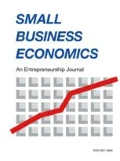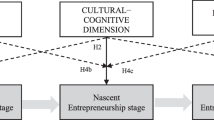Abstract
This paper employs data from the German Socioeconomic Panel (SOEP) and data from the German Social Insurance Statistics to study nascent entrepreneurship. In particular, micro data from the SOEP characterizing employees and nascent entrepreneurs is combined with data characterizing the entrepreneurial environment. The principal findings suggest that individuals are embedded in their local entrepreneurial environment which influences an individual especially at the beginning of the decision process about whether to become self-employed. Work and previous self-employment experience is more important than formal education for the likelihood of being a nascent entrepreneur. Furthermore, social capital is an important stimulus for nascent entrepreneurs. Finally, the results indicate that financial assets are less important for nascent entrepreneurs.
Similar content being viewed by others
References
Howard, E. Aldrich, Organizations Evolving. Reprint. London: Sage Publications (2003).
Howard E. Aldrich and Marlene C. Fiol, Fools Rush in? The Institutional Context of Industry Creation. The Academy of Management Review 19 (1994) 645-670
Howard, E. Aldrich, Linda A. Renzulli and Nancy Langton, Passing on Privilege: Resources Provided by Self-employed Parents to their Self-employed Children. In: Kevin Leicht (ed.) Research in Social Stratification and Mobility, 16. Greenwich, CT: JAI Press (1998) pp. 291-317
David B. Audretsch and Michael Fritsch, The Geography of Firm Births in Germany. Regional Studies 28 (1994) 359-365
David, B. Audretsch and Max Keilbach, Entrepreneurship Capital and Economic Performance. Regional Studies 38 (2004) 949-960
David B. Audretsch, Max C. Keilbach and Eric E. Lehmann, Entrepreneurship and Growth. New York: Oxford University Press (2006).
Timothy Bates, Self-employment Entry Across Industry Groups. Journal of Business Venturing 10 (1995) 143-156
M. E. Beesley and R. T. Hamilton, Small Firm’s Seedbed Role and the Concept of Turbulence. Journal of Industrial Economics 33 (1984) 217-231
Allen N. Berger and Gregory F. Udell, Some Evidence on the Empirical Significance of Credit Rationing. Journal of Political Economy 100 (1992) 1047-1077
David G. Blanchflower and Andrew J. Oswald, What Makes an Entrepreneur?. Journal of Labor Economics 16 (1998) 26-60
David, G. Blanchflower, Andrew Oswald and Alois Stutzer, Latent Entrepreneurship Across Nations. European Economic Review 45 (2001) 680-691
Richard, J. Boden, Gender and Self-Employment Selection: An Empirical Assessment. Journal of Socio-Economics 25 (1996) 671-682
Mark Casson, The Entrepreneur: An Economic Theory. Cheltenham: Edward Elgar (2003).
Constant, Amelie and Klaus F. Zimmermann, 2006, ‘The Making of Entrepreneurs in Germany: Are Native Men and Immigrants Alike?’, Small Business Economics 26(3), 279–300
Davidsson, Per, 2006, “Nascent Entrepreneurship: Empirical Studies and Developments”, Foundations and Trends in Entrepreneurship 2(1), 1–76
Per Davidsson and Benson Honig, The Role of Social and Human Capital Among Nascent Entrepreneurs. Journal of Business Venturing 18 (2003) 301-331
Frédéric Delmar and Per Davidsson, Where Do They Come From? Prevalence and Characteristics of Nascent Entrepreneurs. Entrepreneurship and Regional Development 12 (2000) 1-23
Dohmen, Thomas, Armin Falk, David Huffman, Uwe Sunde, Jürgen Schupp and Gert G. Wagner, 2005, Individual Risk Attitudes: New Evidence from a Large, Representative, Experimentally-Validated Survey, Discussion Paper No. 1730, Bonn: Institute for Labor Studies (IZA)
Paola Dubini, The Influence of Motivations and Environment on Business Start-ups: Some Hints for Public Policy. Journal of Business Venturing 4 (1989) 11-26
Thomas Dunn and Douglas Holtz-Eakin, Financial Capital, Human Capital and the Transition to Self-employment: Evidence from Intergenerational Links. Journal of Labor Economics 18 (2000) 282-305
David Evans and Boyan Jovanovich, An Estimated Model of Entrepreneurial Choice under Liquidity Constraints. Journal of Political Economy 97 (1989) 808-827
Maryann, P. Feldman, The Entrepreneurial Event Revisited: Firm Formation in a Regional Context. Industrial and Corporate Change 10 (2001) 861-891
Michael Fritsch and Udo Brixy, The Establishment File of the German Social Insurance Statistics. Zeitschrift für Wirtschafts- und Sozialwissenschaften/Journal of Applied Social Science Studies 124 (2004) 183-190
Michael Fritsch and Pamela Mueller, Effects of New Business Formation on Regional Development over Time. Regional Studies 38 (2004) 961-975
Fritsch, Michael and Pamela Mueller, 2005, The Persistence of Regional New Business Formation-Activity over Time – Assessing the Potential of Policy Promotion Programs, Papers on Entrepreneurship, Growth and Public Policy #02–2005, Jena, Germany: Max Planck Institute for Research into Economic Systems
Masahisa Fujita and Jacques-Francois Thisse, Economics of Agglomerations. Cities, Industrial Location and Regional Growth. Cambridge: Cambridge University Press (2002).
Masahisa Fujita, Paul R. Krugman and Anthony J. Venables, The Spatial Economy: Cities, Regions, and International Trade. Cambridge: MIT Press (1999).
Van Gelderen, Marco, W., Niels S. Bosma and Roy Thurik, 2001, ‘Setting up a Business in the Netherlands, Who Starts, Who Gives Up, Who is Still Trying?’, EIM Report 47, Zoetermeer
Knut Gerlach and Joachim Wagner, Regional Differences in Small Firm Entry in Manufacturing Industries: Lower Saxony, 1979–1991. Entrepreneurship & Regional Development 6 (1994) 63-80
Javier Gimeno, Timothy B. Folta, Arnold C. Cooper and Carolyn Y. Woo, Survival of the Fittest? Entrepreneurial Human Capital and the Persistence of Under Performing Firms. Administrative Science Quarterly 42 (1997) 750-783
Mark Granovetter, Economic Action and Social Structure: The Problem of Embeddedness. American Journal of Sociology 91 (1985) 481-510
Baron, H. Hamilton, Does Entrepreneurship Pay? An Empirical Analysis of the Returns to Self-Employment. Journal of Political Economy 108 (2000) 604-631
Kim, Phillip, Howard E. Aldrich and Lisa A. Keister, 2007, ‘Access (Not) Denied: The Impact of Financial, Human, and Cultural Capital on Entrepreneurial Entry in the United States’, Small Business Economics (this issue). DOI 10.1007/s11187-006-0007-x
Gary King and Langche Zeng, Logistic Regression in Rare Events Data. Political Analysis 9 (2001) 137-163
Bernard F. Lentz and David N. Laband, Entrepreneurial Success and Occupational Inheritance Among Proprietors. Canadian Journal of Economics 23 (1990) 563-579
Alec R. Levenson and Kristen L. Willard, Do Firms Get the Financing They Want? Measuring Credit Rationing Experienced by Small Businesses in the U.S. Small Business Economics 14 (2000) 83-94
Charles H. Matthews and S. Moser, Family Background and Gender: Implications for Interest in Small Firm Ownership. Entrepreneurship and Regional Development 7 (1995) 365-377
Maria Minniti, Entrepreneurial Alertness and Asymmetric Information in a Spin-Glass Model. Journal of Business Venturing 19 (2004) 637-658
Maria Minniti, Entrepreneurship and Network Externalities. Journal of Economic Behavior and Organization 57 (2005) 1-27
Tobias J. Moskowitz and Annette Vissing-Jørgensen, The Returns to Entrepreneurial Investment: A Private Equity Premium Puzzle?. American Economic Review 92 (2002) 745-778
Mueller, Pamela, André van Stel and David Storey, 2007, The Effects of New Firm Formation on Regional Development over Time: The Case of Great Britain, Small Business Economics (forthcoming)
Simon, C. Parker, The Economics of Self-Employment and Entrepreneurship. Cambridge: Cambridge University Press (2004).
Parker, Simon, C. and Yacine Belghitar, 2007, `What Happens to Nascent Entrepreneurs? An Econometric Analysis of the PSED', Small Business Economics (this issue)
Parker, Simon C. and C. Mirjam van Praag, 2006, Schooling, Capital Constraints and Entrepreneurial Performance: The Endogenous Triangle, (forthcoming) Journal of Business and Economic Statistics
Friedhelm Pfeiffer and Frank Reize, From Unemployment to Self-employment – Public Promotion and Selectivity. International Journal of Sociology 30 (2000) 71-99
Mirjam C. Praag Van and Hans Ophem Van, Determinants of Willingness and Opportunity to Start as an Entrepreneur. Kyklos 48 (1995) 513-540
Linda, A. Renzulli, Howard H. Aldrich and James Moody, Family Matters: Gender, Networks, and Entrepreneurial Outcomes. Social Forces 79 (2000) 523-546
Paul, D. Reynolds, William D. Bygrave and Erkko Autio, Global Entrepreneurship Monitor. 2003 Executive Report. Kansas City: Ewing Marion Kauffman Foundation (2004a).
Paul, D. Reynolds, Nancy M. Carter, William B. Gartner and Patricia G. Greene, The Prevalence of Nascent Entrepreneurs in the United States: Evidence from the Panel Study of Entrepreneurial Dynamics. Small Business Economics 23 (2004b) 263-284
Peter B. Robinson and Edwin A. Sexton, The Effect of Education and Experience on Self-employment Success. Journal of Business Venturing 9 (1994) 141-156
Hector O. Rocha and Rolf Sternberg, Entrepreneurship: The Role of Clusters Theoretical Perspectives and Empirical Evidence from Germany. Small Business Economics 24 (2005) 267-292
AnnaLee Saxenian, Regional Advantage: Culture and Competition in Silicon Valley and Route 128, fifth printing. Cambridge, MA: Harvard University Press (1998).
Scott Shane, Prior Knowledge and the Discovery of Entrepreneurial Opportunities. Organizational Science 11 (2000) 448-469
Albert Shapero, The Entrepreneurial Event. In: Calvin A. Kent (ed.) The Environment for Entrepreneurship. Lexington, MA: Lexington Books (1984) pp. 21-40
Dean A. Shepherd and Dawn R. DeTienne, Prior Knowledge, Potential Financial Reward, and Opportunity Identification. Entrepreneurship Theory and Practice 29 (2005) 91-112
Robert, P. Singh, Gerald E. Hills, Ralph C. Hybels and G. T. Lumpkin, Opportunity Recognition through Social Network Characteristics of Entrepreneurs. In: Paul D. Reynolds, William D. Bygrave, Sophie Manigart, Colin M. Mason, G. Dale Meyer, Harry J. Sapienza and Kelly G. Shaver (eds.) Frontiers of Entrepreneurship Research. Wellesley, MA: Babson College (1999) pp. 228-256
André J. Stel Van and David J. Storey, The Link between Firm Births and Job Creation: Is there a Upas Tree Effect?. Regional Studies 38 (2004) 893-910
Sternberg, Rolf and Ingo Lueckgen, 2005, Global Entrepreneurship Monitor, Unternehmensgründungen im weltweiten Vergleich, Länderbericht Deutschland 2004, Köln
Joachim Wagner, Are Young and Small Firms Hothouses for Nascent Entrepreneurship? Evidence from German Micro Data. Applied Economics Quarterly 50 (2004) 379-391
Wagner, Joachim, 2005, Nascent and Infant Entrepreneurs in Germany: Evidence from the Regional Entrepreneurship, Discussion Paper No. 1522, Bonn: Institute for Labor Studies (IZA)
Joachim Wagner and Rolf Sternberg, Start-up Activities, Individual Characteristics, and the Regional Milieu: Lessons for Entrepreneurship Support Policies from German Micro Data. Annals of Regional Science 38 (2004) 219-240
Paul Westhead, Deniz Ucbasaran, Mike Wright and Martin Binks, Novice, Serial and Portfolio Entrepreneur Behaviour and Contributions. Small Business Economics 25 (2005) 109-132
Paul Westhead and Mike Wright, Novice, Portfolio, and Serial Founders: Are They Different?. Journal of Business Venturing 13 (1998) 173-204
Author information
Authors and Affiliations
Corresponding author
Rights and permissions
About this article
Cite this article
Mueller, P. Entrepreneurship in the Region: Breeding Ground for Nascent Entrepreneurs?. Small Bus Econ 27, 41–58 (2006). https://doi.org/10.1007/s11187-006-6951-7
Accepted:
Published:
Issue Date:
DOI: https://doi.org/10.1007/s11187-006-6951-7




